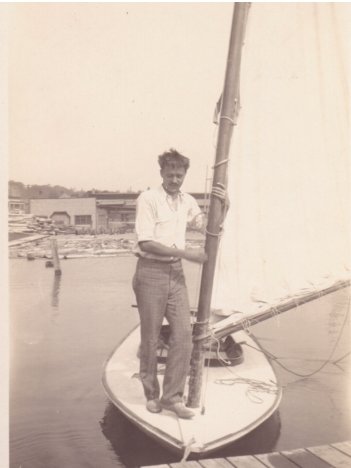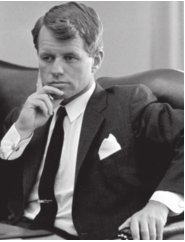
While WWI raged in Europe, German citizens on the homefront faced violent backlash, including tarring and feathering from local vigilance committees — groups of private citizens that took the law into their own hands. The backlash also included lesser actions like Americanizing German-influenced street names or banning German newspapers.
These actions in the name of patriotism made an impact on the young writer John Herrmann, who while home from Europe in 1924 began work on his novel “Foreign Born,” which drew inspiration from the anti-German sentiment taking over his hometown of Lansing.
Herrmann, who while in Europe became the pal of Ernest Hemingway and the lover of Josephine Herbst, a noted socialist writer, had already finished his first novel “What Happens,” which contained numerous thinly-veiled references to his hometown.
‘Bobby Kennedy,’ by Chris Matthews, is City Pulse book choice for June
The City Pulse Book Club will meet on Wednesday, June 6, to discuss “Bobby Kennedy: A Raging Spirit” — 50 years to the day after RFK died after being shot by an assassin the day before.
“I look forward to leading this meeting because I was fortunate enough to meet Kennedy and, sadly, to attend his funeral and burial,” said City Pulse editor and publisher Berl Schwartz. “He was my hero.”
The book, by Chris Matthews, is available at Schuler Books & Music, in Meridian Mall.
The club usually meets there, but for this get-together, it will meet at City Pulse, 1905 E. Michigan Ave., starting at 7 p.m.
The club, which was organized by City Pulse book editor Bill Castanier, is reading a different book each month either about 1968 or published in 1968.
Unfortunately for Herrmann, “What Happens” would be banned in the United States for obscenity and wouldn’t be published again until an English professor researching Herrmann shepherded it through publication in 2016.
Later, while researching the papers of John Herrmann at the Harry Ransom Center at the University of Texas in Austin, English professor Sara Kosiba also made the discovery of an unpublished Herrmann manuscript which called attention to what she calls “hypocritical patriotism.”
Even though Lansing was populated by a large number of German immigrants, many of whom were prominent businessmen, there was a well-organized effort to quell any pro-German sentiment.
During the War, a group of prominent Lansing businessmen formed their own vigilance committee to assure everyone signed up to purchase War Bonds and to “police” those who didn’t pay up or made disparaging comments about the war.
That effort took a nasty turn in 1917 when local butcher William Saier made pro-German comments and was kidnapped and driven to the Riverside Country Club. Saier’s assailants gave him a mock trial and subsequently tarred and feathered him. The day after the event, a short article on the front page of the Lansing State Journal reporting that a group of 20 white robed men had participated. The headline declared: “Uncle of Crack Cub First Baseman Gets Coat of Tar.”
Herrmann’s novel “Foreign Born” uses this incident as one of the major plot points.
In real life, the Lansing State Journal would be slapped with a libel suit by Saier, who was the uncle of one of Lansing’s most famous sports figures, Vic Saier, the slugging first baseman for the Chicago Cubs.
The incident divided the community and made great fodder for Herrmann’s novel, which could not find a publisher.
Kosiba, who has studied Herrmann and his writing, said prospective publishers liked the novel, but told her it needed editing, something Herrmann didn’t like to do.
“It is the only novel ever written that took on the anti-German feeling of the country,” Kosiba said. “Willa Cather had addressed it in her 1922 novel, ‘One of Ours,’ but not indepth,” she said.
She said the novel, much like “What Happens,” is “rather raw and needs some polish.”
Once again, Kosiba, who worked with the Hastings Press in Iowa to publish “What Happens,” has arranged for the publishing of “Foreign Born.” For the book, Kosiba has written an introduction that gives the novel context.
In addition to the complete manuscript, the book also includes a second version of the ending, which was published by William Carlos Williams in his “Contact” magazine in 1932.
In the alternate ending the German has repented and is once again accepted in the community rather than being an outcast, as he’s portrayed in the original ending.
“I don’t like the second ending as much,” Kosiba said.
Kosiba said she believes that Herrmann’s inspiration for the novel was a concert at the Liederkranz Club, which was located on North Grand Avenue.
“Herrmann’s novel details literally what would’ve been happening in Lansing at the time and it is his most insightful novel,” she said.
It is also Herrmann’s only novel to be written entirely in Michigan.
Note: the author of this article is the president of the HSGL, which is sponsoring the Kosiba event.
Lansing Historical and Literary Events: Sara Kosiba
Tuesday, May 15, 7 p.m. Library of Michigan 702 W. Kalamazoo St. www.lansinghistory.blogspot.com (517) 282-0671 Dan Johnson, author of “The Detroit Electric Scheme” Monday, May 14, 7 p.m. R.E Olds Transportation Museum 240 Museum Dr., Lansing www.reoldsmuseum.org (517) 372-0529 Lansing’s “Germantown” Tour with David Siwik Thursday, May 17, 7 p.m. LCC Administration Building Board Room 610 Capitol Ave., Lansing www.lansinghistory.blogspot.com (517) 282-0671
Support City Pulse - Donate Today!
Comments
No comments on this item Please log in to comment by clicking here